As we are witnessing drastic shifts in organizational culture and structure, organizations can not afford to overlook the importance of proper training of their employees. With the new trends of working, such as hybrid work environments and cross-border collaborations in mind, there is a strong need to prepare employees for them. The software has thus been identified as a revolutionary tool with the potential to revolutionize the approach used in organizations to deliver training and improve performance among employees.
This article will help you learn about the 15 best employee training software tools, and the features, advantages, and costs of each tool to enable the selection of the best tool for your business.
What Is Corporate Training Management Software?
Employee training software is an application for the delivery of, / an application used to effectively deliver, manage, and monitor, employee training and development programs in organizations. From new hires to training capacity building, or compliance these applications enhance the efficiency of training throughout the process. Common elements are usually such functions as course building, tracking of progress, generation of reports, and connection to other business solutions.
Types of Training Supported
- Leadership Training: Promote leadership skills for all the team managers and supervisors.
- Compliance Training: Ensure the basics of safety, legal, and security issues are included when doing their post.
- Onboarding Training: Observe new employees easily settle into their positions at the organization.
- Technical Training: Teach your employees how to use certain tools or technology.
- Sales Training: Improve on existing knowledge of the product and the various techniques used to market the product.
- Diversity Training: Promote the concept of Diversity and multiculturalism in the workplace.
Key Features of Employee Training Software
To create impactful training experiences, ensure your chosen E-learning Platforms for Workforce Development includes these essential features:
- Course Management: Enable effective assembly of a course catalog with graduation and assignment of courses that will use templates.
- Content Authoring Tools: For technically challenged people, make appealing, engaging content that enables 2-Way conversation.
- Collaborative Learning: Allow team members to share the information and vice versa engage actively in the discussion.
- Automation: Reduce the possibility of repeating similar messages for course reminders and creating course schedules.
- Reporting & Analytics: Identify the level of progress, accomplishment, and student learning results.
- Customizable UI: Customize the interface to compensate for your organization’s branding solution.
- Third-Party Integration: Integrate easily with the HR systems, customer relationship management systems, or any other platform.
Quick Comparison
| Tool Name | Best Fit | Why Useful |
| 360Learning | Large enterprises focusing on integrated and competency-based training | Collaborative learning, AI-assisted course creation, and custom branding |
| OttoLearn | Companies prioritizing microlearning | Gamified and scaffolded training with multi-language support |
| SC Training | Organizations with dispersed mobile learners | AI-powered course creation and strong mobile accessibility |
| Rippling LMS | Mid to large organizations using Rippling for HR and IT | Integrates LMS with HR, IT, and payroll systems for seamless operations |
| SkyPrep | Employers using live, interactive training sessions | Virtual classrooms, SCORM compliance, and customizable interface |
| WorkRamp | SMEs scaling employee and partner training programs | Custom learning paths, gamification, and seamless integrations |
| Thrive | Organizations fostering a continuous learning culture | Blended learning with compliance tracking and content curation |
| LearnUpon LMS | Companies with diverse training programs | Blended learning, multi-tenant portals, and automation tools |
| EdApp | Companies with employees working remotely | Mobile-first microlearning with gamification |
| Docebo LMS | Large organizations needing scalable learning solutions | AI-powered personalization, strong analytics, and social learning modules |
| SAP Litmos | Enterprises requiring varied training across teams | Blended learning, mobile app, and advanced analytics |
| Absorb LMS | Organizations seeking engaging training solutions | AI recommendations, multimedia support, and detailed reporting |
| TalentLMS | SMEs looking for affordable and scalable training tools | Custom branding, automation, and mobile compatibility |
| Blackboard Learn | Educational institutions | Advanced tools for classroom and online learning environments |
| Cornerstone LMS | Large enterprises focusing on employee development | Comprehensive talent management, skill assessments, and integrations |
List of 15 Best Employee Training Software Tools
1. 360Learning

360Learning is a Affordable Employee Training Software that uses AI in the process of building personalized training. It integrates features of a learning management system, learning experience platform, and collaboration functions that allow organizations to enhance the calibers of employees.
Key Features:
- AI-Assisted Authoring: Join for free today then build courses and quizzes at the click of a button with the help of AI.
- Collaborative Learning: The idea behind it is that employees and experts create content together for a better experience for the users.
- Custom Branding: Organize your artistic academies corresponding to your brand image.
Pros:
- Particularly easy to use for someone who does not have too much experience with computers and web applications.
- Appeal features to increase interest.
- Support of multiple language training material.
Cons:
- The main disadvantage of the scope of this software is that it has limited advanced reporting features.
- May take some time to initiate the agreed working relationships.
- Similar to the previous two factors: It is relatively high in price as compared to its contenders in different markets.
Ideal For: Major planning by large enterprises was on integrated and competency-based training.
Pricing: Paid plans starting at $8/registered user per month
Rating: 4.6/5
Website: https://360learning.com/
2. OttoLearn

OttoLearn spans the best of game-based microlearning and delivers simple and effective knowledge-based content on learners’ preferred interests. Regarding its LMS, it changes its learning characteristics so that it may achieve mastery of performance, thereby making it suitable for performance improvement.
Key Features:
- Gamified Learning: Integrated games, a competition table, and incentives.
- Scaffolded Training: Takes learners progressively through all the levels to reach the last level of mastery.
- Multi-Language Support: Information accessible in more than one hundred languages.
Pros:
- Also supports being up-to-date in one’s knowledge.
- Integration with the current working systems such as Okta.
- Very individual development.
Cons:
- Learners use this format for microlearning, but not extended learning or complete training.
- Advanced course design ideas are scarce for the relatively low amount.
- High setup costs.
Ideal For: Companies and centers providing microlearning as a key approach to lifelong learning.
Pricing: Microlearning plans start at $250 /month
Rating: 4.5/5
Website: https://www.ottolearn.com/
3. SC Training
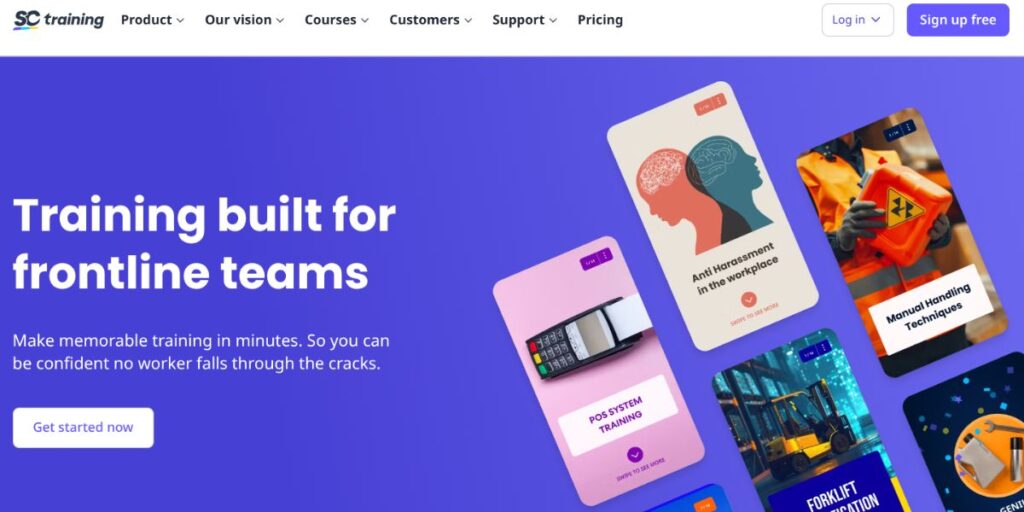
SC Training is a Employee Skill Development Software to is most suitable for delivery in a flexible setup. They have the course creator which is powered by artificial intelligence to create whole training modules. The tool also has the use of games and competitions in addition to its use of quizzes for the students.
Key Features:
- AI Create: Saves time needed for creating the courses for mobile learning.
- Interactive Content: Quizzes and elements of games.
- Extensive Templates: Templates for enabling mass production of new courses without much effort.
Pros:
- Easy to use for junior/senior level employees without programming knowledge.
- Strong mobile accessibility.
- Exceptional support team.
Cons:
- Limited advanced analytics.
- Least suitable for large and complicated training sessions.
- Lack of training with mobile devices.
Ideal For: Organizations that want to ensure that mobile learning is delivered to their dispersed workers.
Pricing: Free plan available. Paid plan starts at $5/user/month.
Rating: 4.7/5
Website: https://training.safetyculture.com/
4. Rippling LMS
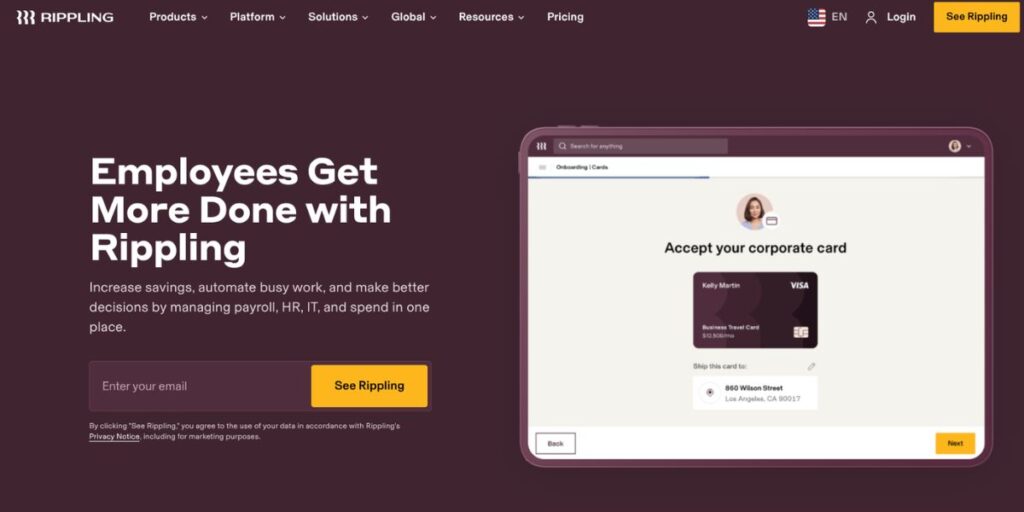
Rippling LMS is part of the suite called Rippling, which unifies the tools for HR, IT, and payroll. Self-organising learning that is integrated with other key organizational functions makes this platform a perfect solution for effective delivery, tracking, and automation of employee training. This platform offers several hundred templates for easily deployable compliance training, onboarding courses, and development programs.
Key Features:
- Comprehensive Integration: It includes the blended model of learning management together with HR and IT.
- Mobile Learning: Easily connect to training content of any type, on any device.
- Pre-Built Templates: Reduces course development time by availing of ready-made teaching aids.
Pros:
- Easy to go about as the web design involves the client making it very friendly to handle.
- A large amount of emphasis on compliance training.
- Third, it is versatile in the number of third parties that it can interface with.
Cons:
- Only a few options for customization if the training model is rather complicated.
- Most appropriate for those organizations that are already incorporating Rippling in their operations.
- The costs may rise rapidly when the features offered to clients are added frequently.
Ideal For: Mid to large organizations who sign up for Rippling’s suite for HR and IT.
Pricing: Custom pricing based on package selection.
Rating: 4.5/5
Website: https://www.rippling.com/
5. SkyPrep
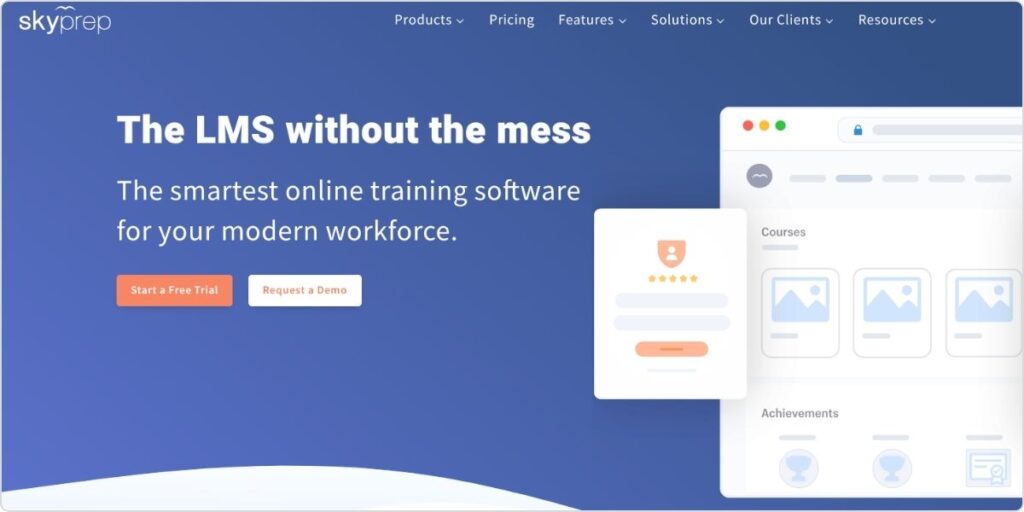
SkyPrep is an Corporate Training Management Software that aims to provide the functional requirements needed by enterprises that seek to manage the training processes in their organizations without any added technological enhancements. It has a highly user-friendly design for minimal interactions with IT support; it easily and effectively performs the following: It comes equipped with good course authoring functions and flexible templates to accommodate any organization.
Key Features:
- Virtual Classroom: Hold meetings with live training while tracking attendance at those meetings.
- SCORM Compliance: Fulfills the industry norms of learning.
- Customizable Interface: Customize the appearance of the platform for your company.
Pros:
- Diffusion: Rather easy to implement integration into larger organizations.
- Excellent Reporting and Analysis tool.
- Excellent customer support.
Cons:
- Fewer gamification elements in comparison with the closest competitors.
- Most suitable where the organization is big, for small companies it might just be too complex.
- The sophistication of customizations means other configuration steps will be needed before the software begins executing.
Ideal For: Employers encouraging the use of live and interactive training sessions.
Pricing: Contact for pricing.
Rating: 4.6/5
Website: https://skyprep.com/
6. WorkRamp
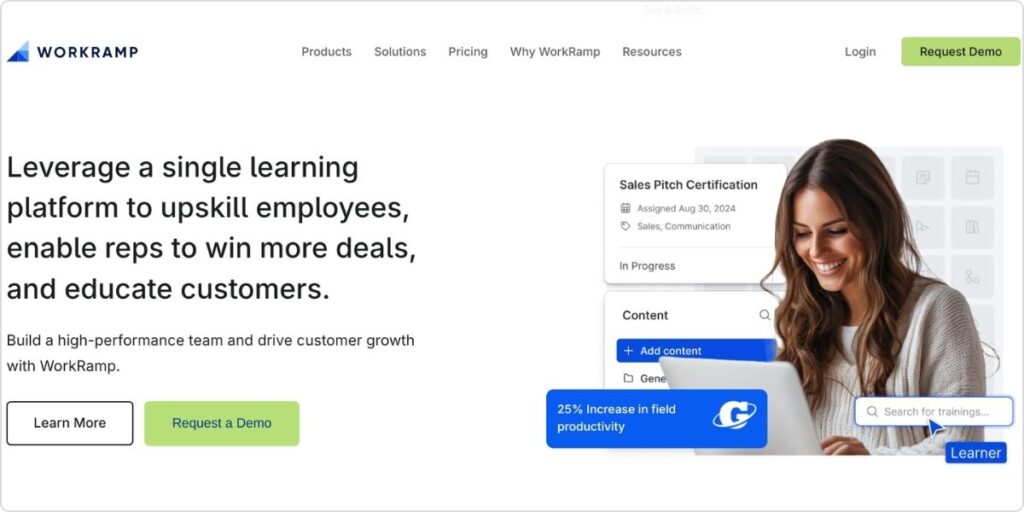
WorkRamp is a cloud-based LMS that allows organizations to train their employees, customers, and partners. One of the priorities of the platform is development of the custom training that works for the role or the department. Nevertheless, WorkRamp is perfect for rapidly growing companies that require top-level approaches to training. The tool has available content types, which can include videos, presentations, and pieces of content.
Key Features:
- Custom Learning Paths: Special training courses which may be designed for a particular position or organizational unit.
- Gamified Content: Introducing leaderboards and badges for better stimulation of the students.
- Seamless Integration: Can interact with the company’s customer relationship management and productivity tools such as Slack.
Pros:
- Highly scalable for growing organizations.
- Excellent for employee onboarding and compliance training.
- Real-time progress tracking and analytics.
Cons:
- Pricing may be prohibitive for small businesses.
- Limited options for advanced technical training.
- Requires initial setup for custom integrations.
Ideal For: SMEs looking to scale employee and partner training programs.
Pricing: Available upon request.
Rating: 4.7/5
Website: https://www.workramp.com/
7. Thrive
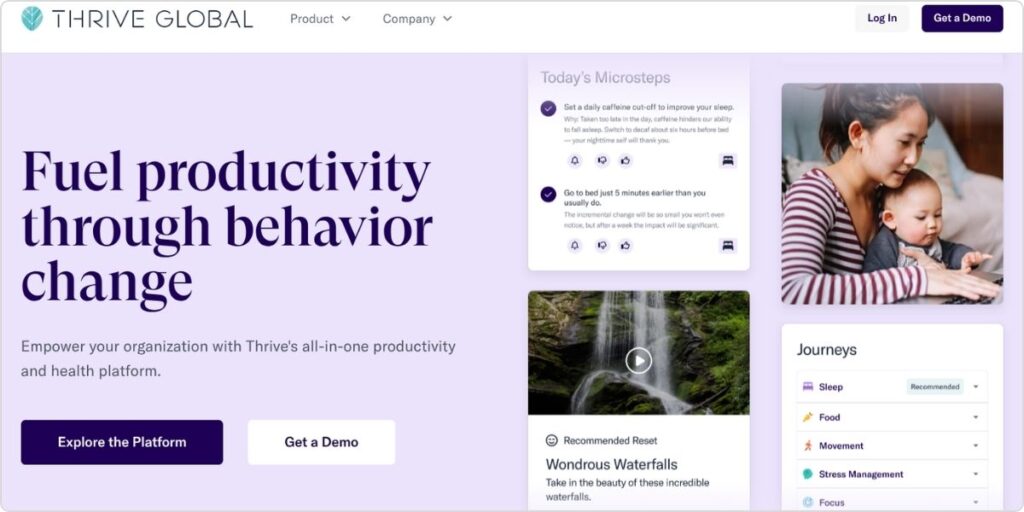
LMS compliance standards, social learning, and paths are all wrapped into one system Thrive. This approach is aimed at promoting constant training and active participation of the employees besides meeting a compliance training requirement. Thrive enables content collection and assimilation where the consolidated training can contain outside sources such as videos, articles, and podcasts.
Key Features:
- Content Curation: Add other sources of learning to make the material even more comprehensible.
- Skills Management: They learn how to identify and close skill gaps well.
- Social Learning: Encourage people to want to work together, learn from one another, and share new ideas.
Pros:
- Paves the way for the promotion of a working culture that is characterized by constant learning.
- Excellent features in the tracking and reporting of compliance.
- Blending options that can easily menu with future and performance management systems.
Cons:
- This means that it will take longer for new users to get familiar with MapReduce as compared to experienced Hadoop developers.
- Some features will need extra charges to be incurred in their provision.
- Deficiency in the extent of offline learning facilities.
Ideal For: Organisations planning on creating a culture of learning within the firm.
Pricing: Request For pricing.
Rating: 4.6/5
Website: https://thriveglobal.com/
8. LearnUpon LMS
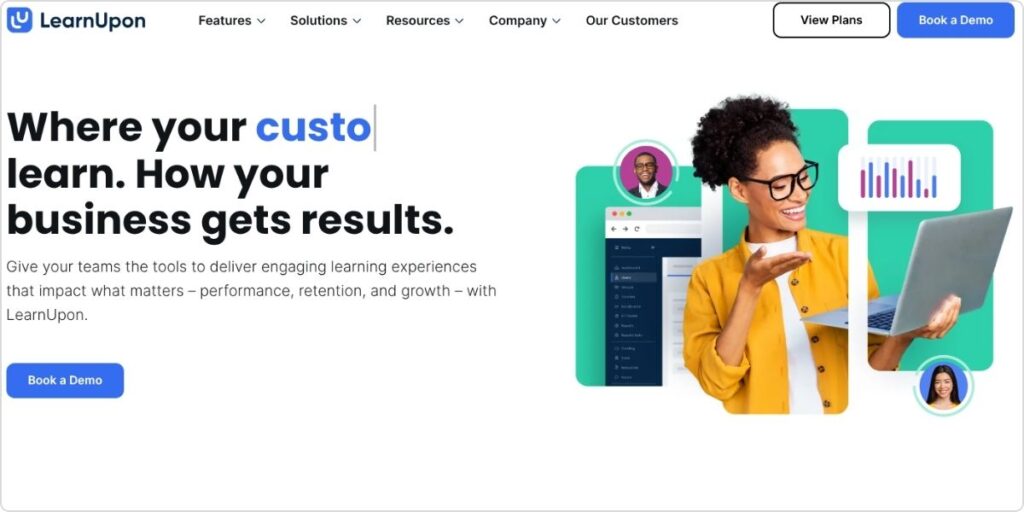
LearnUpon LMS is a software-as-service offering that targets delivering training to employees, customers, and partners. Certain things include the LearnUpon training management system which easily organizes the training process. The platform accommodates a range of content types; videos, SCORM files, and PDFs empowering flexibility in course development. It also has tools for blended learning meaning face-to-face lessons supplemented by online classes or vice versa.
Key Features:
- Blended Learning: Integrated approach incorporating both internet-based and conventional training techniques.
- Multi-Tenant Portals: Train various audiences in one place as they share this learning management system.
- Automation Tools: Optimise hassles such as enrollments and notifications.
Pros:
- Simple and intuitive interface.
- Excellent customer support and onboarding assistance.
- Scalable for organizations of all sizes.
Cons:
- Limited gamification features.
- Some advanced analytics require higher-tier plans.
- Occasional challenges with third-party integrations.
Ideal For: Companies offering diverse training programs to multiple audiences.
Pricing: Custom pricing based on organization size and needs.
Rating: 4.7/5
Website: https://www.learnupon.com/
9. EdApp
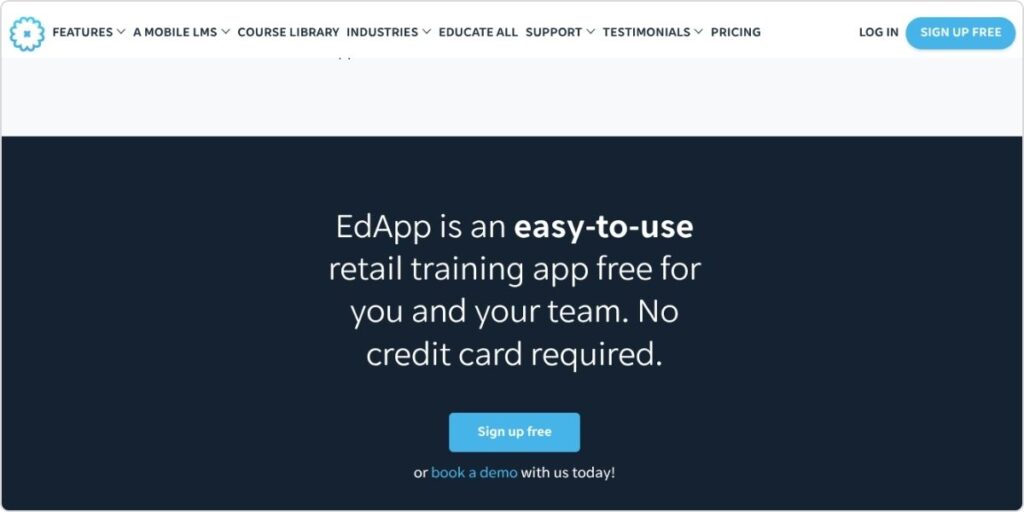
As a mobile-first LMS for micro-learning, EdApp is a great solution for businesses that want effective training in short bursts. The content authoring tool makes it possible for the learners to build more courses that are easy to follow especially when on the move. Activity features include among others quizzes, polls, and other games that make it easy to engage a group of learners.
Key Features:
- Microlearning Focus: Provide short and effective training workshops.
- Mobile Accessibility: Work in a smartphone and tablet-friendly environment.
- Gamification: Increase interaction by using various bright and colorful activities.
Pros:
- Some features of this software are free of charge, especially for the new small friend teams.
- Compelling content types.
- Perfect for use by companies with employees who spend most of their time away from their desks.
Cons:
- Limited features to support large organizational and complicated training requirements.
- Certain functions stretched out in the analytics tab are only available for premium-price subscribers.
- Altering can be done less, which makes flexibility for customization also restricted.
Ideal For: Businesses and companies that have several employees working under different conditions.
Pricing: Basic packages are free while paid packages will cost you $5/user/month onwards.
Rating: 4.6/5
Website: https://www.edapp.com/retail-lms/
10. Docebo LMS
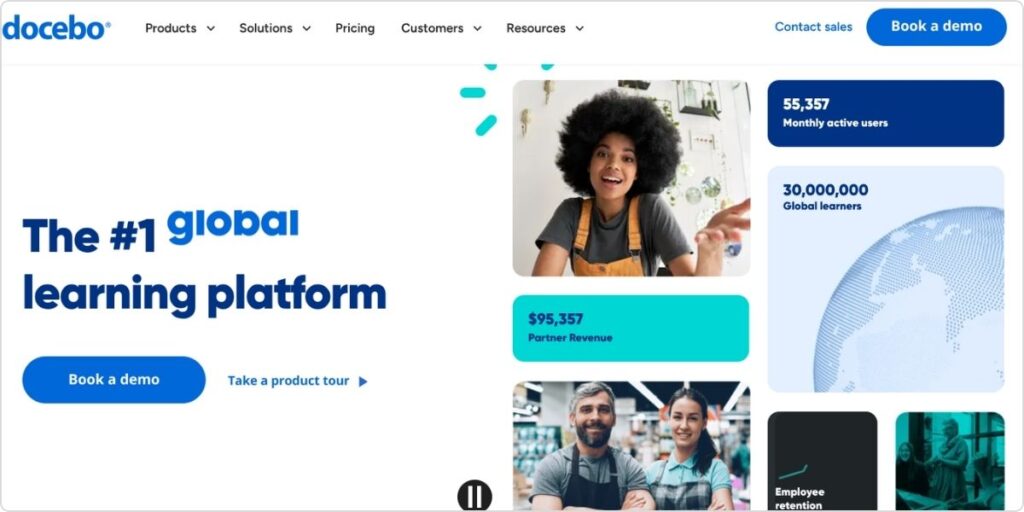
Docebo LMS is a high-end platform leveraged with features such as artificial intelligence to ensure learners with unique experiences. The platform has a tremendous level of customization hence the ability of businesses to develop a learning environment that is uniquely branded. Again, Docebo’s AI identifies users’ behaviors and suggests content that is appropriate for training and keeps the training effective.
Key Features:
- AI-Powered Learning: Adopt the preferences of the learners when it comes to training.
- Social Learning Module: Promote use and thus facilitate cross-organizational and cross-functional interaction and exchange of knowledge.
- Content Marketplace: A couple of such relevant tasks are: Use pre-built courses stored in a specialized library.
Pros:
- Highly scalable and customizable.
- Strong analytics and reporting features.
- Integrates with popular tools like Salesforce and Slack.
Cons:
- The steep learning curve for administrators.
- Premium pricing may not suit small businesses.
- Advanced features require higher-tier plans.
Ideal For: Large organizations seeking scalable and personalized learning solutions.
Pricing: Available upon request.
Rating: 4.8/5
Website: https://www.docebo.com/
11. SAP Litmos
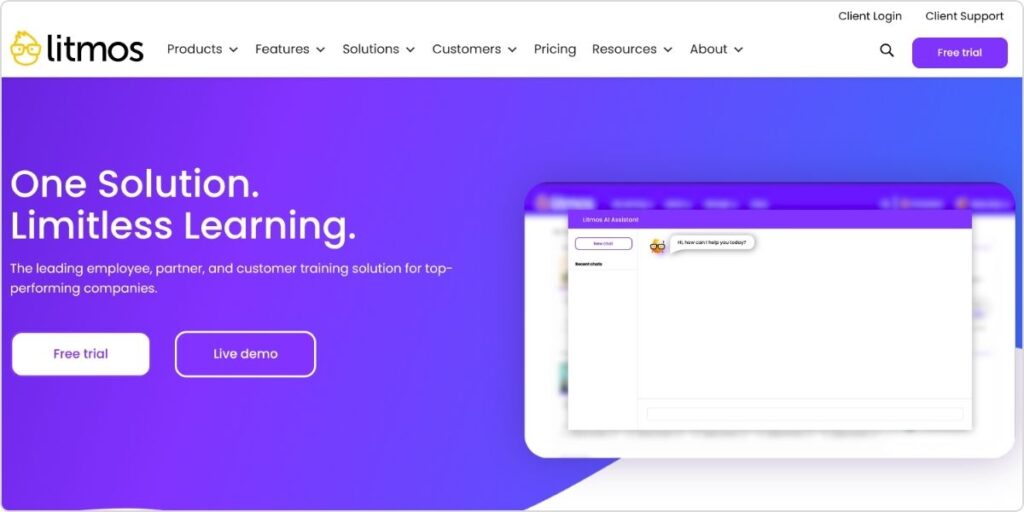
SAP Litmos is an LMS for enterprises that stress the stability and capability of the system. It provides a strong foundation to provide end-user training, compliance training, and sales savvy training. SAP Tools Litmos again allows the creation of an exceptional course by incorporating videos, quizzes, and so on. The platform is very helpful for blended delivery and integration with virtual classrooms if required. Its reporting and analytics services give one a clear picture of learner activity and the effectiveness of the training program.
Key Features:
- Blended Learning: Merges online and face-to-face contact modes.
- Mobile App: Available for use on any device to support additional training.
- Advanced Analytics: Track accomplishment and evaluate results of training investments.
Pros:
- Lots of materials from different types of multimedia.
- It is easily scalable to accommodate the increasing business demands at the different growing stages.
- The high degree of compliance training.
Cons:
- Pricing is on the higher end.
- Small variations of differentiation can be applied in different courses.
- Many integration setups take a lot of time to implement.
Ideal For: Learners requiring different types of training across a business.
Pricing: Contact for pricing.
Rating: 4.7/5
Website: https://www.litmos.com/
12. Absorb LMS
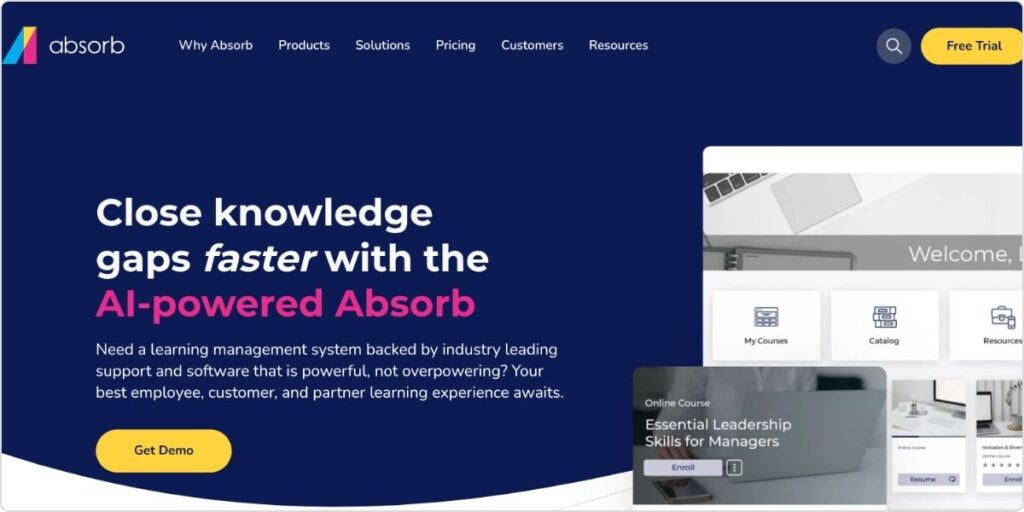
Another platform that is highly recommended by its users is called Absorb LMS; this solution has won awards because it was created to provide users with an engaging, and easy training solution. It covers many types of content, including videos SCOs, and live webinars, just to name a few. Using the mechanism of AI, the learners are navigated to courses that they might be interested in while the reporting dashboard covers the progress of the training and performance.
Key Features:
- AI-Driven Recommendations: Ensure the development of individual learning trails for any user.
- eCommerce Integration: Market courses available for consumption to the users through the platform.
- Custom Branding: Make the LMS look like the rest of your company visually.
Pros:
- User-friendly interface for administrators and learners.
- Excellent customer support and onboarding.
- Flexible and scalable for organizations of all sizes.
Cons:
- Higher pricing for advanced features.
- Limited gamification options.
- Some customization requires technical expertise.
Ideal For: Businesses looking to monetize training content or scale their training programs.
Pricing: Custom pricing based on company size.
Rating: 4.6/5
Website: https://www.absorblms.com/
13. Cornerstone OnDemand

Cornerstone OnDemand is a highly functional LMS intended for supporting large-scale learning and talent management requirements. This platform has stable functionalities for eLearning, compliance training, and the development of employees. Its intelligent skill profiling assists organizations in the discovery of deficient skills and suggests courses that could close the gap.
Key Features:
- Skill Tracking: Have recommendations by analyzing past and developing skills with the help of AI.
- Course Marketplace: Get connected to a diverse collection of preset courses.
- Custom Learning Paths: Identify, develop, set, and implement manageable and interactive learning paths for workers.
Pros:
- However, if you want to cope with training and development, you need effective and progressive instruments for understanding and growing your staff.
- Tools of analytics for monitoring interactions and efficiency.
- The ability to integrate well with other human resources applications.
Cons:
- It is expensive, especially for small businesses.
- Slopes sharply curve for new users of the touchpad.
- In basic forms of subscription, there is little to no degree of customization.
Ideal For: Enterprises looking to integrate learning with talent management.
Pricing: Custom pricing; is available on request.
Rating: 4.7/5
Website: https://www.cornerstoneondemand.com/
14. TalentLMS
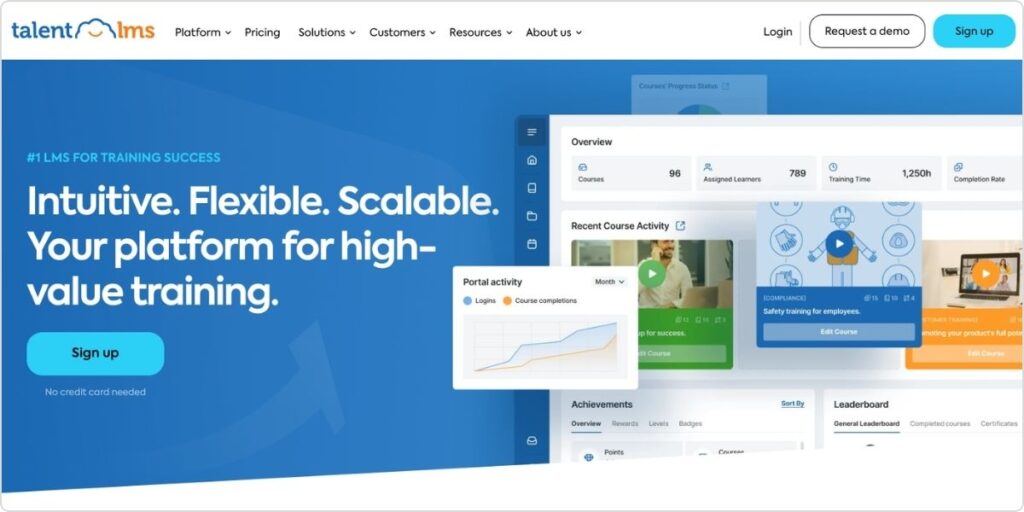
TalentLMS is a versatile application that may be useful to companies of any scale and industry. It supports a range of content types, such as video, PDF, or SCORM files, which make the course learning/creation extensively diverse. TalentLMS focuses on the simplicity of LMS has pre-designed templates, and comes with integration compatibility with the top apps such as Zoom and Salesforce. The platform also has a facility for creating game-like practices that enhance learning.
Key Features:
- Gamification: Adding more and more badges, points, and, of course, the essential, thoughtful leaderboards.
- Content Upload: Friendly features that are available are compatible with many file formats, including SCORM.
- Pre-Configured Integrations: It can easily integrate with other platforms such as Zoom.
Pros:
- Pricing – Low cost, provided by monthly subscription as well as free of charge.
- The following are the benefits; easy to use and that acts as an interface between the user and the device.
- Helpful for small and medium enterprises as well.
Cons:
- Fewer customization features are available for clients in lower plans.
- Services such as API access are only available in pro-versions of the application.
- It therefore now makes sense to compare Baictools to full-blown enterprise-grade LMSs.
Ideal For: Small to medium-sized businesses and startups.
Pricing: Free plan available; paid plans start at $89/month for up to 40 users.
Rating: 4.5/5
Website: https://www.talentlms.com/
15. iSpring Learn

iSpring Learn is our corporate LMS that will make training engaging, efficient, and utterly safe. This makes it especially useful for organizations that need an uncomplicated content creation and management system that is highly dependable since it offers authors easy operations to create relevant content that the target learners can find quickly. This system has provisions to deploy nearly all forms of content and can track the learning progress most comprehensively.
Key Features:
- Intuitive User Interface: I think it helps in improving the trainer’s as well as the learner’s navigation.
- Built-in Content Authoring: Aids in making prompt and effective training tools.
- Advanced Reporting Tools: I think it gives full information on learner performance and completion rates for the course.
Pros:
- Easy to set up and implement.
- High security and reliability priorities etc.
- High compatibility with the existing cor educational tools and procedures at the corporation.
Cons:
- Some level of branding can be done, but not at the ultimate level.
- May not always encompass some complex gamification elements.
- Higher COGS and the associated higher prices as far as small-scale teams are concerned.
Ideal For: Any corporate training situation, particularly in organizations that require an efficient, secure, and user-friendly environment with ELC authoring capabilities.
Pricing: Paid plans start at $770 USD per author/year
Rating: 4.7/5
Website: https://www.ispringsolutions.com/
Conclusion
Many organizations find it impossible to operate without the use of employee training software for training their workers. When choosing an LMS, a business can ensure that it does away with all training complications and results in a better-trained workforce and improved organizational performance in the long run.
FAQs
1. What is employee training software?
Employee training tools provides methodologies and tools to design, develop, and monitor courses within the organization for its human resources.
2. What steps may I follow in selecting the correct training software?
The primary criteria to look for include the creation of courses, assessing capabilities, integration options, and continued usability.
3. Can small businesses benefit from using employee training software?
Indeed, several business platforms provide small business solutions at a scale.
4. Is training software capable of being employed in the compliance processes?
Absolutely. Like most tools, most of the tools have options that allow for tracking of compliance training completion.
5. What are the productivity levels of the best employee training software?
Pricing is quite flexible, starting at $10 per user per month, to the enterprise customer-tailored price.

